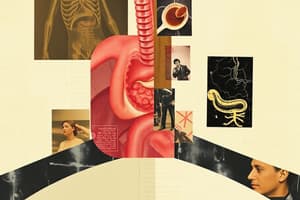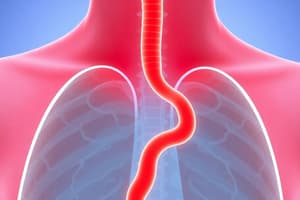Podcast
Questions and Answers
What effects does norepinephrine release have on gastrointestinal function during stress?
What effects does norepinephrine release have on gastrointestinal function during stress?
- Decreased enzyme release
- Inhibition of secretions (correct)
- Increased motility
- Increased sphincter tone (correct)
What is the most appropriate nursing action upon discovering white lesions in a client with AIDS?
What is the most appropriate nursing action upon discovering white lesions in a client with AIDS?
- Make a referral to the unit's dietitian.
- Attempt to remove the lesions with a tongue depressor.
- Encourage the client to gargle with salt water.
- Inform the primary provider of this finding. (correct)
How should a nurse best describe a peptic ulcer to a client diagnosed with this condition?
How should a nurse best describe a peptic ulcer to a client diagnosed with this condition?
- Bleeding from the mucosa in the stomach
- Viral invasion of the stomach wall
- Erosion of the lining of the stomach or intestine (correct)
- Inflammation of the lining of the stomach
How should the nurse reassure a client about the safety of an abdominal ultrasound?
How should the nurse reassure a client about the safety of an abdominal ultrasound?
What factor most likely contributed to the late diagnosis of a client with gastric cancer?
What factor most likely contributed to the late diagnosis of a client with gastric cancer?
What is the nurse's priority when suctioning a client who has undergone a neck dissection?
What is the nurse's priority when suctioning a client who has undergone a neck dissection?
What should be integrated into the care of a client with Barrett esophagus?
What should be integrated into the care of a client with Barrett esophagus?
What is an appropriate discharge outcome for a client recovering from gastric surgery?
What is an appropriate discharge outcome for a client recovering from gastric surgery?
Which data should the nurse consider most significantly related to the etiology of chronic gastritis?
Which data should the nurse consider most significantly related to the etiology of chronic gastritis?
A client with significant psychosocial stress is likely to experience what change in gastrointestinal function?
A client with significant psychosocial stress is likely to experience what change in gastrointestinal function?
What should a community health nurse anticipate including in the care plan for a client after total gastrectomy for gastric cancer?
What should a community health nurse anticipate including in the care plan for a client after total gastrectomy for gastric cancer?
What is the potential impact of stress on digestive enzyme release?
What is the potential impact of stress on digestive enzyme release?
What is the typical cause of Helicobacter pylori infection that a nurse should inform a client?
What is the typical cause of Helicobacter pylori infection that a nurse should inform a client?
What is the priority nursing intervention after a client’s grafting procedure?
What is the priority nursing intervention after a client’s grafting procedure?
Which statement about the symptoms of gastric cancer is true?
Which statement about the symptoms of gastric cancer is true?
What dietary change is most important for a client recovering from gastric surgery to promote healing?
What dietary change is most important for a client recovering from gastric surgery to promote healing?
What should the nurse assess a client for after scheduling a total gastrectomy due to feelings of body mutilation?
What should the nurse assess a client for after scheduling a total gastrectomy due to feelings of body mutilation?
Which health problem should the nurse consider referring the client to the primary provider for assessment?
Which health problem should the nurse consider referring the client to the primary provider for assessment?
What dietary adjustment should be taught to a client with chronic constipation?
What dietary adjustment should be taught to a client with chronic constipation?
What is the best initial action for a nurse observing bright red stoma with slight blood on a client who had an ileostomy three days ago?
What is the best initial action for a nurse observing bright red stoma with slight blood on a client who had an ileostomy three days ago?
In assessing a client with acute diverticulitis, what should the nurse do if the client shows a sudden increase in temperature and abdominal rigidity?
In assessing a client with acute diverticulitis, what should the nurse do if the client shows a sudden increase in temperature and abdominal rigidity?
For a client presenting with symptoms of a small bowel obstruction, which intervention should the nurse prioritize?
For a client presenting with symptoms of a small bowel obstruction, which intervention should the nurse prioritize?
In managing a client with dumping syndrome, which teaching point is essential for the nurse to cover?
In managing a client with dumping syndrome, which teaching point is essential for the nurse to cover?
Which condition could lead to esophageal or gastric obstruction that the nurse should assess in a newly admitted client?
Which condition could lead to esophageal or gastric obstruction that the nurse should assess in a newly admitted client?
What area of assessment should the nurse prioritize for a patient who underwent surgery for esophageal cancer?
What area of assessment should the nurse prioritize for a patient who underwent surgery for esophageal cancer?
Which intervention should the nurse include in the immediate postoperative plan of care for a client who had esophageal surgery?
Which intervention should the nurse include in the immediate postoperative plan of care for a client who had esophageal surgery?
When addressing long-term needs for a client who had oral cancer surgery, which goal should be prioritized?
When addressing long-term needs for a client who had oral cancer surgery, which goal should be prioritized?
What finding in wound drainage during the first 24 hours post neck dissection should prompt the nurse to notify the healthcare provider?
What finding in wound drainage during the first 24 hours post neck dissection should prompt the nurse to notify the healthcare provider?
Which medication may be prescribed to increase the pace of gastric emptying for a client with GERD?
Which medication may be prescribed to increase the pace of gastric emptying for a client with GERD?
What advice should a nurse give to a client diagnosed with a hiatal hernia regarding meal consumption?
What advice should a nurse give to a client diagnosed with a hiatal hernia regarding meal consumption?
What should the nurse ensure is included in discharge teaching for a client with a rigid fixation of a mandibular fracture?
What should the nurse ensure is included in discharge teaching for a client with a rigid fixation of a mandibular fracture?
Which intervention is most appropriate for a nurse to implement when caring for a client recovering from neck dissection?
Which intervention is most appropriate for a nurse to implement when caring for a client recovering from neck dissection?
Which assessment is crucial for identifying a major complication of total parenteral nutrition (TPN)?
Which assessment is crucial for identifying a major complication of total parenteral nutrition (TPN)?
What condition indicates the need to start parenteral nutrition (PN) for a client with acute pancreatitis?
What condition indicates the need to start parenteral nutrition (PN) for a client with acute pancreatitis?
What principle should guide the nurse when administering intravenous fat emulsions concurrently with parenteral nutrition?
What principle should guide the nurse when administering intravenous fat emulsions concurrently with parenteral nutrition?
Which action should the nurse take when initiating parenteral nutrition (PN) for a postoperative client?
Which action should the nurse take when initiating parenteral nutrition (PN) for a postoperative client?
What is a potential risk of becoming dependent on laxatives?
What is a potential risk of becoming dependent on laxatives?
In the context of parenteral nutrition, what does the term 'infusion rate' refer to?
In the context of parenteral nutrition, what does the term 'infusion rate' refer to?
When monitoring a client receiving TPN, which finding would be of greatest concern?
When monitoring a client receiving TPN, which finding would be of greatest concern?
What is the primary benefit of using a Y-connector for intravenous fat emulsions with PN?
What is the primary benefit of using a Y-connector for intravenous fat emulsions with PN?
Flashcards are hidden until you start studying
Study Notes
Gastrointestinal Disorders
-
Norepinephrine release due to stress can cause decreased gastrointestinal motility, increased sphincter tone, and inhibition of secretions.
-
White lesions on the oral mucosa in a client with AIDS could be a sign of oral candidiasis (thrush), and this finding should be reported to the primary provider.
-
Abdominal ultrasound is considered safe in clients who are not pregnant.
-
Suctioning a client after a modified radical neck dissection: Avoid applying suction on or near the suture line.
-
Barrett esophagus is a condition where the lining of the esophagus changes to resemble the lining of the stomach. This can lead to malignant changes, and thus the client needs to be closely monitored.
-
Postoperative care for a client who underwent esophageal cancer surgery: Focus on maintaining airway patency, preventing gastric reflux, and promoting oxygenation with chest physiotherapy. Long term care focuses on enhancing verbal communication and providing support.
-
Jackson-Pratt drain drainage after neck dissection: Milky or cloudy drainage is concerning and should be reported to the healthcare provider.
-
Metoclopramide is a medication that can increase the pace of gastric emptying, which can be beneficial in managing GERD symptoms.
-
Hiatal hernia: Clients with a hiatal hernia should eat smaller amounts more frequently.
-
Rigid fixation of a mandibular fracture: Educate the client on appropriate wound care and follow-up appointments.
-
Peptic ulcer disease: It is a condition characterized by erosion of the lining of the stomach or intestine.
-
Gastric cancer: Late diagnosis is often attributed to vague and nonalarming early symptoms.
-
Post-gastric surgery: Aim for maintaining or gaining weight after surgery, as this indicates adequate recovery and nutritional intake.
-
Chronic gastritis: Smoking is a major risk factor for chronic gastritis.
-
Total gastrectomy: Clients often require enteral feeding via a gastrostomy tube (G tube) after this surgery.
-
H. pylori infection: It is usually acquired through oral-oral or fecal-oral routes.
-
Dumping syndrome: It is a common complication after gastric surgery where food moves too quickly from the stomach into the small intestine.
-
Total gastrectomy for gastric cancer: Address the client's concerns about body image due to the surgery.
-
Chronic constipation: Promote normal bowel function with a high-residue, high-fiber diet and regular physical activity.
-
Ileostomy: A bright red stoma with scant blood is expected after surgery and does not require specific action.
-
Acute diverticulitis: A sudden increase in temperature, exquisite abdominal tenderness, and abdominal rigidity are signs of possible perforation and require urgent medical attention.
-
Small bowel obstruction: Insertion of a nasogastric tube is prioritized to decompress the bowel.
-
Laxative dependence: Long-term use of laxatives can lead to decreased bowel function and electrolyte imbalances.
-
**Total parenteral nutrition (TPN): ** Monitoring blood glucose levels helps identify a major complication of TPN, hyperglycemia.
-
Acute pancreatitis: TPN is indicated if the client is unable to meet nutritional needs orally for 7 days.
-
Intravenous fat emulsions: They can be infused simultaneously with PN through a Y-connector close to the infusion site and should not be filtered.
-
Starting parenteral nutrition (PN): Begin slowly and monitor the client's fluid and glucose tolerance.
-
Discontinuing parenteral nutrition: Gradually wean the client off PN and monitor for signs of hypoglycemia.
Studying That Suits You
Use AI to generate personalized quizzes and flashcards to suit your learning preferences.




